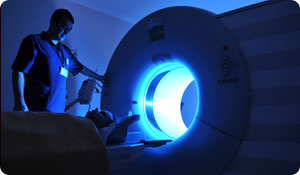
There's no question that advanced imaging techniques help us detect cancer and other serious diseases, allowing early-and potentially life-saving-intervention. However, is it possible to have too much of a good thing? When it comes to full-body scans, the answer may be yes.
Full-body scans (computed tomography, also called CT or CAT scans), create 3D x-ray images from the shoulder to the pelvis. CT scans take a detailed image of bone, soft tissue, and blood vessels, all at the same time. You can obtain full-body scans without a physician's referral.
Proponents of full-body scans say they provide peace of mind and are useful for detecting illnesses before they become symptomatic, particularly heart disease and some cancers.
However, full-body scans are controversial among radiologists and the broader medical community. The Food and Drug Administration (FDA) and the American College of Radiology (ACR) don't endorse them, referring to them as off-label (non-approved) use of CT scans. They are not a recognized standard of care nor do they meet generally accepted criteria for an effective screen procedure. The FDA and ARC say there is no scientific evidence that these scans provide more benefits than harms.
Full-body scans expose you to high levels of exposure. For example, the radiation in one full-body scan is approximately 150 times more than a chest x-ray and nearly 100 times more than a typical mammogram. In one analysis, researchers estimated the lifetime cancer risk mortality from a single full-body CT scan in a 45-year old adult at one in 1,250. As a point of reference, they said, in 1999, the odds of dying in an auto crash were roughly one in 5,900.
Results of full-body scans can cause needless worry or create a false sense of security if the scan fails to detect an existing problem. Imaging tests often uncover something that is not, or would not become, medically significant had it continued undetected. These false positives often lead to further testing or other potentially risky interventions.
In an article about unnecessary medical testing, author Martin Donohoe, MD, writes, "use of clinically unjustified tests also erodes the scientific underpinnings of medical practice and sends a mixed message to trainees and patients about when and why to use diagnostic studies. Such use also runs counter to physicians ethical obligations to contribute to the responsible stewardship of healthcare resources."
If you are considering a full-body scan, be sure you fully understand all the risks and benefits so you can make an informed decision.
Sources:
Pennachio, Dorothy L. "Full-body scans--or scams?" Medical Economics. Web. 9 August 2002.
http://medicaleconomics.modernmedicine.com/memag/Psychiatry+%26+Behavioral+Health/Full-body-scans--or-scams/ArticleStandard/Article/detail/116402
Querna, Elizabeth. "Full-body scan." US News and World Report. Web. 7 September 2004.
http://health.usnews.com/usnews/health/briefs/cancer/hb040907.htm
Food and Drug Administration. "Full-Body CT Scans - What You Need to Know." Web. 6 April 2010.
http://www.fda.gov/Radiation-EmittingProducts/RadiationEmittingProductsandProcedures/MedicalImaging/MedicalX-Rays/ucm115340.htm
Brenner, David J., PhD, DSc, and Elliston, Carl D., MA. "Estimated Radiation Risks Potentially Associated with Full-Body CT Screening." Radiology 232 (2004): 735-738. Web. 23 July 2004.
http://radiology.rsna.org/content/232/3/735.full
Martin Donohoe, MD, FACP. "Unnecessary Testing in Obstetrics, Gynecology, and General Medicine: Causes and Consequences of the Unwarranted Use of Costly and Unscientific (Yet Profitable) Screening Modalities ." Medscape Medical News. Web. 30 April 2007.
http://www.medscape.com/viewarticle/552964





